What does Canadian citizenship mean? .. Dion’s case troubles 61% in Globe online poll
Dec 13th, 2006 | By Citizen X | Category: Key Current Issues The Globe and Mail is as close as Canada gets to an anglophone newspaper of record. And its readers are no representative sample of Canadian voters. But the paper’s online poll over the December 9 weekend is still worth further attention. It asked: “Does it trouble you that newly elected Liberal leader Stephane Dion has Canadian-French dual citizenship?” Some 61% of more than 47,000 respondents answered Yes. These numbers finally raise the forgotten long story of Canadian citizenship. I.e., there were no Canadian citizens at all until 1947. Residents of Canada were British subjects before then. And there have been further twists and turns over the past 60 years. It may be impossible to have a serious public debate about all this today. But it probably is what ought to be done.
The Globe and Mail is as close as Canada gets to an anglophone newspaper of record. And its readers are no representative sample of Canadian voters. But the paper’s online poll over the December 9 weekend is still worth further attention. It asked: “Does it trouble you that newly elected Liberal leader Stephane Dion has Canadian-French dual citizenship?” Some 61% of more than 47,000 respondents answered Yes. These numbers finally raise the forgotten long story of Canadian citizenship. I.e., there were no Canadian citizens at all until 1947. Residents of Canada were British subjects before then. And there have been further twists and turns over the past 60 years. It may be impossible to have a serious public debate about all this today. But it probably is what ought to be done.
Harper tries to twist the knife (if there really is one)?
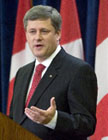 Federal Conservative leader and current minority prime minister, Stephen Harper, has offered one testament to what some see as the current political mileage in the new federal Liberal leader’s status as a dual citizen of both Canada and France.
Federal Conservative leader and current minority prime minister, Stephen Harper, has offered one testament to what some see as the current political mileage in the new federal Liberal leader’s status as a dual citizen of both Canada and France.
According to the Canadian Press: “Stephen Harper took a thinly disguised jab at Stphane Dion, subtly suggesting Friday [December 8] the new Liberal leader might want to surrender his French citizenship … The prime minister noted Gov.-Gen. Michalle Jean gave up her French citizenship shortly after being named to the vice-regal post …
“As you know the Governor General was faced with a similar decision and I certainly supported her decision when she gave up her (French) citizenship,’ Mr. Harper said when asked about the matter … Obviously, I think everyone has a right to select options under the law, they have to use their own political judgment.'”
It is probably worth stressing that Prime Minister Harper offered this opinion “when asked about the matter” by reporters. So you can’t exactly say that the Conservatives rushed in any unseemly way to exploit what may or may not prove an early chink in Stephane Dion’s armour.
 M. Dion himself has also said that “he’d be willing to give up his French citizenship if it poses a problem with the Canadian public … Mr. Dion was born in Canada, but his mother was born in France. As a result he holds dual citizenship … The Liberal Leader told [TV Ontario] host Steve Paikin that he has kept his French citizenship out of respect for his mother.”
M. Dion himself has also said that “he’d be willing to give up his French citizenship if it poses a problem with the Canadian public … Mr. Dion was born in Canada, but his mother was born in France. As a result he holds dual citizenship … The Liberal Leader told [TV Ontario] host Steve Paikin that he has kept his French citizenship out of respect for his mother.”
You can of course discuss and debate all this without any reference at all to the still comparatively recent historical evolution of Canadian citizenship – as the Comment sections to the Globe and Mail‘s reprints of the relevant Canadian Press reports show. (And as was also more engagingly and instructively demonstrated, in Canada’s most populous province, by the December 11 edition of Steve Paikin’s TV Ontario program, The Agenda.)
But you will miss some important deeper parts of the story, and what it ultimately means today, if you do.
John A. Macdonald never was a Canadian citizen … and all that …
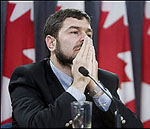 When you get to the very bottom of the issue of Stephane Dion as a dual citizen, you do wind up asking what Canadian citizenship means today. (As journalist Andrew Coyne was also stressing on TV Ontario on December 11.)
When you get to the very bottom of the issue of Stephane Dion as a dual citizen, you do wind up asking what Canadian citizenship means today. (As journalist Andrew Coyne was also stressing on TV Ontario on December 11.)
To try to urge the relevance of the history of the concept to any present discussion of this sort may well be a hopeless task in the current Canadian political climate. The effort makes so much sense, however, that it is worth trying anyway.
The Canadian Press report on Prime Minister Harper’s views about Stephane Dion’s citizenship, e.g., contends that: “Several Canadian prime ministers, including Sir John A. Macdonald, have held dual citizenships … Canada’s first PM was born in Glasgow and emigrated from Scotland when he was five …
 “Liberal Alexander Mackenzie was also born in Scotland. Conservative Mackenzie Bowell was a native of England, as was Liberal John Turner … If Mr. Dion is elected prime minister, he would be the first person with dual citizenship to be born in Canada. He would also be the first to hold dual citizenship with a country other than Britain.”
“Liberal Alexander Mackenzie was also born in Scotland. Conservative Mackenzie Bowell was a native of England, as was Liberal John Turner … If Mr. Dion is elected prime minister, he would be the first person with dual citizenship to be born in Canada. He would also be the first to hold dual citizenship with a country other than Britain.”
Yet this kind of talk is finally just a quaint attempt to force our present assumptions about what Canada is today back on a past that held quite different assumptions itself.
The facts are that none of John A. Macdonald, Alexander Mackenzie, or Mackenzie Bowell ever were citizens of Canada, let alone dual citizens of Canada and Britain. From the start of the present confederation in 1867 to just after the Second World War in 1947, there was no such legal status as a Canadian citizen. And there were no Canadian citizens anywhere, period.
 The Canada that began in 1867 was not a Canadian national state (as it more or less indisputably is nowadays, at the edge of 2007 – as its own independent member of the United Nations, e.g., or signatory of NAFTA, NATO, and on and on). It was the first self-governing dominion of the British empire. And from 1867 to 1947 people born in or otherwise living as naturalized residents of Canada were legally classed as British subjects, at home and abroad.
The Canada that began in 1867 was not a Canadian national state (as it more or less indisputably is nowadays, at the edge of 2007 – as its own independent member of the United Nations, e.g., or signatory of NAFTA, NATO, and on and on). It was the first self-governing dominion of the British empire. And from 1867 to 1947 people born in or otherwise living as naturalized residents of Canada were legally classed as British subjects, at home and abroad.
When John A. Macdonald moved from Scotland to Canada, he was just moving from one to another part of the (then locally so-called) greatest global empire since Rome, on which the sun never dared to set. He had no need to acquire any new citizenship and he was no kind of dual citizen. As he proudly boasted in his last Canadian federal election campaign in 1891: “A British subject I was born – a British subject I will die.”
Paul Martin’s father and the Canadian Citizenship Act of 1947 …
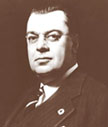 By the end of the Second World War Canada had progressed far enough along the road to its present national status to create some problems for the old legal regime of British subjects.
By the end of the Second World War Canada had progressed far enough along the road to its present national status to create some problems for the old legal regime of British subjects.
As explained in an official document of Citizenship and Immigration Canada today: “one significant symbol of independent nationhood – Canadian citizenship – would find legal recognition in 1947, two years after the war. Up until that point, Canadian nationals had been legally defined as British subjects, both in Canada and abroad …
“The credit for fathering the project that gave legal recognition to the term Canadian citizen’ goes to the Liberal Cabinet Minister Paul Martin Sr. The Minister first conceived the idea of a separate Canadian citizenship during the Second World War, but it was not until he visited the military cemetery at Dieppe after the war that the idea really seized hold of him …
 “The deplorable state of Canada’s naturalization laws added a note of urgency to his mission. Not only was there no such thing in law as a Canadian citizen; there were also ambiguities in the Naturalization Act of 1914, the Canadian Nationals Act of 1921 (it provided a definition of Canadian nationals,’ a requirement for Canadian participation in the League of Nations and membership in the International Court of Justice), and the Immigration Act of 1910, the three pieces of legislation that dealt with citizenship.”
“The deplorable state of Canada’s naturalization laws added a note of urgency to his mission. Not only was there no such thing in law as a Canadian citizen; there were also ambiguities in the Naturalization Act of 1914, the Canadian Nationals Act of 1921 (it provided a definition of Canadian nationals,’ a requirement for Canadian participation in the League of Nations and membership in the International Court of Justice), and the Immigration Act of 1910, the three pieces of legislation that dealt with citizenship.”
At the end of the Second World War, Paul Martin Sr. (father of the Paul Martin Jr. who was prime minister of Canada 2003-2006) had declared in Parliament, on October 22, 1945: “For the national unity of Canada and for the future and greatness of this country it is felt to be of utmost importance that all of us, new Canadians or old, have a consciousness of a common purpose and common interests as Canadians; that all of us are able to say with pride and say with meaning: I am a Canadian citizen.'”
Finally, the first Canadian Citizenship Act “was enacted on 27 June 1946 and came into force on 1 January 1947.” It “provided for the conferring of a common Canadian citizenship on all Canadians, whether or not they had been born in Canada.”
Citizens of the world today … and Canada too?
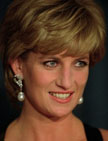 The pace of change in Canadian political history has been stupendously gradualist, and (some would say) a bit too often in the extremely cautious tradition of two steps forward and one step back . Even after the Canadian Citizenship Act of 1947 various aspects of the old regime of Canadians as British subjects hung on.
The pace of change in Canadian political history has been stupendously gradualist, and (some would say) a bit too often in the extremely cautious tradition of two steps forward and one step back . Even after the Canadian Citizenship Act of 1947 various aspects of the old regime of Canadians as British subjects hung on.
Under the 1947 legislation, British subjects migrating from other parts of the old global empire that was rapidly turning into the modern Commonwealth of Nations still had many privileges of citizenship in Canada, e.g., and could become Canadian citizens more easily than migrants from other places. But all this finally changed in a new Citizenship Act of 1977 – which, among other things, ended all forms of special treatment for British subjects in Canadian citizenship law.
 At the same time, it could be said that even the new Canadian Citizenship Act of 1977 kept up some of the, as it were, premonitions of a wider global citizenship implicit in the abandoned old trans-national concept of a British subject, by introducing the concept of dual citizenship.
At the same time, it could be said that even the new Canadian Citizenship Act of 1977 kept up some of the, as it were, premonitions of a wider global citizenship implicit in the abandoned old trans-national concept of a British subject, by introducing the concept of dual citizenship.
As explained by Citizenship and Immigration Canada: “Unlike the law in effect in Canada up to 1977, the current Citizenship Act allows Canadian citizens to acquire a foreign nationality without automatically losing their Canadian citizenship.
 “Since February 15, 1977, a Canadian citizen who acquires another nationality may retain Canadian citizenship, unless he or she voluntarily applies to renounce it and the application is approved by a citizenship judge. The current act thus makes it possible to have two or more citizenships and allegiances at the same time for an indefinite period.”
“Since February 15, 1977, a Canadian citizen who acquires another nationality may retain Canadian citizenship, unless he or she voluntarily applies to renounce it and the application is approved by a citizenship judge. The current act thus makes it possible to have two or more citizenships and allegiances at the same time for an indefinite period.”
According to recent Canadian Press reports, nowadays an “estimated 700,000 dual citizens live in Canada, though many more – the numbers are unclear – live abroad.” (TV Ontario on December 11 seemed to be reporting that there are as many as 4 million Canadians with dual citizenships all told.)
Governor General Jean, Canadian Lebanese, and Stephane Dion as dual citizens today …
 The current controversy over new federal Liberal leader Stephane Dion’s status as a dual citizen is just the latest blip in a Canadian news line that has been running for a few years now. As Prime Minister Stephen Harper has just noted, “the Governor General was faced with a similar decision … when she gave up her (French) citizenship” – back when she was appointed in 2005.
The current controversy over new federal Liberal leader Stephane Dion’s status as a dual citizen is just the latest blip in a Canadian news line that has been running for a few years now. As Prime Minister Stephen Harper has just noted, “the Governor General was faced with a similar decision … when she gave up her (French) citizenship” – back when she was appointed in 2005.
More recently, just this past summer, many Canadians were “a bit puzzled by the news that there are only an estimated 25,000 Americans … in Lebanon,'” when “officials estimate that at least 50,000 Canadians’ are (or were) there (as of July 18, 2006).”
The answer was apparently that there are a great many more dual citizens of Canada and Lebanon than there are dual citizens of the United States and Lebanon – even though the United States has (almost) 10 times more people generally than Canada. (Though Canada, Canadians also like to remember, does have a somewhat larger national geographic territory.)
 For many Canadians, such freshly discovered facts of current Canadian life in themselves are bound to raise the question of whether the 1977 change in Canadian legislation that permitted dual citizenship has been officially pursued somewhat too aggressively. (And as newly independent MP Garth Turner tried to politely point out on TV Ontario on December 11, 2006, to take just one of many such examples, resident Canadian taxpayers rather unwittingly forked over a nice pile of change this past summer, to rescue substantial numbers of mere Canadian “citizens of convenience” from the latest bout of Lebanese political unrest in the Middle East.)
For many Canadians, such freshly discovered facts of current Canadian life in themselves are bound to raise the question of whether the 1977 change in Canadian legislation that permitted dual citizenship has been officially pursued somewhat too aggressively. (And as newly independent MP Garth Turner tried to politely point out on TV Ontario on December 11, 2006, to take just one of many such examples, resident Canadian taxpayers rather unwittingly forked over a nice pile of change this past summer, to rescue substantial numbers of mere Canadian “citizens of convenience” from the latest bout of Lebanese political unrest in the Middle East.)
The argument against pursuing all this too far, of course, is that, in this as some other respects, the majority of Canadians do not want to emulate the majority of Americans at the moment (assuming that the majority of Americans do agree with current US citizenship policy – and Canadians with Canadian citizenship policy, and so forth).
 Dual citizenship, that is to say, is easier to achieve in Canada than in the United States at the moment, because Canada is somewhat more open to the wider world beyond North America than the United States. For many Canadians that is finally a good not a bad thing.
Dual citizenship, that is to say, is easier to achieve in Canada than in the United States at the moment, because Canada is somewhat more open to the wider world beyond North America than the United States. For many Canadians that is finally a good not a bad thing.
Any serious historian is probably bound to suspect that it also reflects the deeper Canadian historical experience with the old crypto-global citizenship concept of the trans-national British subject, in the old empire on which the sun never dared to set.
Among other things, the still burning embers of all this, especially in Canadian official life, lend the current international flirtation with wider and more global concepts of citizenship a degree of conservative respectability that it still notably lacks in the United States.
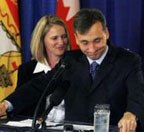 And, finally, Canada being what it is in the early 21st century, the latest particular citizenship cases of both Stephane Dion and Governor General Jean deal with particular French rather than British expressions of the old global cosmopolitanism of the imperial West.
And, finally, Canada being what it is in the early 21st century, the latest particular citizenship cases of both Stephane Dion and Governor General Jean deal with particular French rather than British expressions of the old global cosmopolitanism of the imperial West.
On this particular spin of the story, objecting to Stephane Dion’s dual citizenship in Canada and France is just a complaint that the other citizenship is French and not British. (Even though John A. Macdonald, e.g., was a British subject period, and not a dual citizen of Canada and Britain, and Stephane Dion was born in Canada, and so forth.) And no sensible Canadian nowadays wants anything to do with any archaic argument of this sort at all.
What if anything is to be done?
 Apart from anything else, it seems clear enough that to abolish the legal concept of dual citizenship in Canada – to go back to the way things were before 1977 in this respect, as some voices have been urging lately – would actually put Canada behind the United States on some index of openness to the wider global village.
Apart from anything else, it seems clear enough that to abolish the legal concept of dual citizenship in Canada – to go back to the way things were before 1977 in this respect, as some voices have been urging lately – would actually put Canada behind the United States on some index of openness to the wider global village.
There are some dual citizens of the United States and Lebanon and elsewhere nowadays, even if this is still not officially encouraged, as they say. (Moreover, there are dual citizens of the United States and Canada, e.g. Who in Canada today really wants to discourage that concept, officially or otherwise? And under current US law if a Canadian citizen cannot also be a dual citizen of the United States, then a US citizen can certainly not be a dual citizen of Canada.)
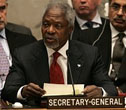 At the same time, the 61% of more than 47,000 respondents who answered Yes to “Does it trouble you that newly elected Liberal leader Stephane Dion has Canadian-French dual citizenship?”, in the Globe and Mail‘s online poll over the December 9 weekend, are still raising an important enough concern in Canada today.
At the same time, the 61% of more than 47,000 respondents who answered Yes to “Does it trouble you that newly elected Liberal leader Stephane Dion has Canadian-French dual citizenship?”, in the Globe and Mail‘s online poll over the December 9 weekend, are still raising an important enough concern in Canada today.
In Canada we still seem to have a great deal of trouble discussing this concern, in a way that successfully navigates all the cultural minefields in current Canadian political debate. But it may be enough to say that the 61% are trying to speak up for the concern that Paul Martin Sr. first expressed in October 1945, when he introduced his original quest for the concept of the modern Canadian citizen in Parliament:
 “”For the national unity of Canada and for the future and greatness of this country it is felt to be of utmost importance that all of us, new Canadians or old, have a consciousness of a common purpose and common interests as Canadians; that all of us are able to say with pride and say with meaning: I am a Canadian citizen.'”
“”For the national unity of Canada and for the future and greatness of this country it is felt to be of utmost importance that all of us, new Canadians or old, have a consciousness of a common purpose and common interests as Canadians; that all of us are able to say with pride and say with meaning: I am a Canadian citizen.'”
Personally, I think this concern does not mean that Stephane Dion has to renounce his French citizenship, as the excellent Mme Michaelle Jean renounced hers when she became governor general last year. I do not think there should be any rule, unwritten or otherwise, that says a potential Canadian prime minister (or governor general for that matter) cannot be a dual citizen of Canada and some other country. (Just as I don’t think a potential Canadian prime minister should have to be born in Canada, as a potential US president must be born in the USA.)
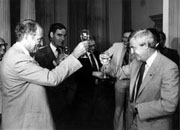 But it does seem to me that too much of recent Canadian citizenship debate has paid too little attention to the interests of the great majority of Canadians, who even today are not dual citizens (on whatever recent confusing estimate of the numbers you choose to believe).
But it does seem to me that too much of recent Canadian citizenship debate has paid too little attention to the interests of the great majority of Canadians, who even today are not dual citizens (on whatever recent confusing estimate of the numbers you choose to believe).
Put another way, Canadian citizenship itself is still a comparatively recent phenomenon in Canadian history. It still needs much nurturing and encouragement in its own right – for, as Paul Martin Jr. put it in 1945, “the national unity of Canada and for the future and greatness of this country.”
At least for those among us who do, while worrying quite a lot about the global village, also believe first in the future of Canada, for ourselves and our grandchildren and their grandchildren too, and anyone else in world who may be interested, it wouldn’t hurt to hear some voices raised more clearly and vigorously on this side of the debate as well.
 Maybe one thing these voices might be saying, e.g., is that it’s time to stop compelling naturalized new citizens of Canada to swear allegiance to the British monarchy. (A.k.a. nowadays “Her Majesty Queen Elizabeth the Second, Queen of Canada, Her Heirs and Successors.” In Canada’s fellow Commonwealth parliamentary democracy of Australia, e.g., new citizens nowadays simply “pledge my loyalty to Australia and its people, whose democratic beliefs I share, whose rights and liberties I respect, and whose laws I will uphold and obey.”)
Maybe one thing these voices might be saying, e.g., is that it’s time to stop compelling naturalized new citizens of Canada to swear allegiance to the British monarchy. (A.k.a. nowadays “Her Majesty Queen Elizabeth the Second, Queen of Canada, Her Heirs and Successors.” In Canada’s fellow Commonwealth parliamentary democracy of Australia, e.g., new citizens nowadays simply “pledge my loyalty to Australia and its people, whose democratic beliefs I share, whose rights and liberties I respect, and whose laws I will uphold and obey.”)
This is one of the very last vestiges of the old trans-national British subject in our present citizenship law. It is still only confusing Canadian citizens and everyone else about just what Canadian citizenship means. And it is still working to thwart Paul Martin Sr.’s 1945 concern with our “consciousness of a common purpose and common interests as Canadians,” such that “all of us are able to say with pride and say with meaning: I am a Canadian citizen.'”
At any rate, that too is something Mr. Harper’s current minority government might want to look into in greater depth, as part of the review of the whole question of dual citizenship announced last month by Citizenship and Immigration Minister Monte Solberg. If we the great majority of the Canadian people – as represented by our elected Government of Canada – are not going to take our own independent citizenship seriously, how can we expect anyone else to do the same?

